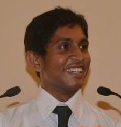| Sun. June 01, 2025 | |

|
|
|
 Sri Lankans were looked for a change with sanguine hopes on good governance, reconciliation, and development when the current president Maithripala Sirisena came into power in 2015. However the great expectations yearned by Sri Lankans began to fade away with the lethargic, inefficient rule of the new government and the most recent ethnic tension in the island has become its’ worst nightmare. The anti-Muslim violence in Kandy , Sri Lanka has driven the nation to a deplorable situation and at least two people have been killed and eight other injured in the anti-Muslim riots occurred in the central province of Sri Lanka. Muslims are consisted of 10% of the population with the high concentration in the Eastern province of Sri Lanka and Sinhalese account for 70% of the population. The tension between the Sinhalese majority and Muslims minority emerged after Sri Lanka militarily defeated Tamil separatist movement by marking the end of 30years long bloody civil war in 2009. Not a single sign of hostility was erupted between Sinhalese and Muslims during the civil war era whereas some Muslim youth even joined the Sri Lankan defense forces. Nevertheless some hard line political agendas from both Sinhalese and Buddhist communities emerged in post war in Sri Lanka and their impacts strongly began to deteriorate the existed harmony between two ethnic communities. Especially the rise of hard line Sinhalese Buddhist nationalist organizations during the former president Mahinda Rajapakshe’s era notably urged the Sinhalese Buddhist majority to boycott Muslim shops and creating Islamphobic narrative gutted the Muslim community considerably. Such a space set the path for the expansion of extreme Islamic ideologies like Wahhabism and it has been reported some of Sri Lankan Muslims joined ISIS in 2014. In fact those foolhardy acts done by Sinhalese Buddhist hardliners dragged the tension between Sinhalese and Buddhists for a bad edge in the recent past. The above mentioned facts clearly indicate the ongoing violence against Muslims in Sri Lanka has been erupted as an outcome of the continuation of extremism and government’s inability to thwart the rise of ethno religious extremism has worsen the situation. Few days prior to the incident took place in Kandy groups of people set fire to Muslim owned business and attacked a mosque in the Eastern province of Sri Lanka after suspecting that Muslim hotel was adding contraceptives to food served for Sinhalese customers. This incident was portrayed as an existential threat for Sinhalese nation in social media like Face Book and Twitter by some hardcore Sinhalese Buddhist groups and such provocative propagandas finally accelerated the speared of the events against Muslims. However the accusation on Buddhist monks as the biggest agitators cannot be justified as many of the Buddhist monks have openly condemned the attacks against Muslims and more interestingly a Buddhist monk and few young Sinhalese Buddhists stayed spent the night at a mosque situated in Muruthalawa, Kandy to ensure its safety on 6th of March . In fact the despicable acts committed by few Sinhalese Buddhist fanatics, who are completely contradictory to the basic principles of Buddhism have disfigured the image of the nation badly. The extensive use of social media in spreading the malicious news against Muslims as an evil force was set prior to the beginning of the hullabaloo in Kandy. The recent event was bolstered by anti-Muslim Facebook propagandas. These Facebook campaigns against Muslims have not emerged out of the blue. In Sri Lanka, its genesis was associated with the rise of far right Sinhalese Buddhist nationalist forces after the end of civil war on the island. The fabricated stories about the rise of Muslim population as a potential threat for Sinhalese Buddhist identity became poisoning factors and many moderate civil society organizations attempted to counter this myth, but to no avail. In observing the rise of hatred towards Muslims in Sri Lanka, the younger generation seems to have been involved in many Facebook and other social media campaigns to propagate far right Sinhalese Buddhist extremism as a result of the influence from newly emerged far right Sinhalese Buddhist groups. To a certain extent, some Muslim youth have also been exposed to Islamic extremism in social media. As a matter of fact, the communal disharmony provoked by social media can be taken as the main cause of creating the unrest in Sri Lanka. From the outset, the Government could not identify the danger or prevent it. The decision taken by the government to block social media temporally as a method to control the racist propagandas and declaration of state of emergency in the island will not be long standing solutions for the ongoing problem. The control of social media could be a double edge sword for the government as it has become an integral part of the island nation. Nevertheless, if Sri Lanka fails to control anti-Muslim agitation at this stage, its consequences could be severe as how Sri Lanka once suffered after failing to prevent 1983 July riots against Tamils, which eventually dragged the island nation for a brutal civil war. Especially the apathy of Sri Lankan government to tame the hardline Sinhalese Buddhist groups may create a sense of uncertainty among the Muslim minority and its end can lead to another gruesome armed struggle in future.
Punsara Amarasinghe is a Doctoral Candidate in International Law at National Research University Higher School of Economics in Moscow. He has studied in University of Colombo, Faculty of Law and South Asian University, New Delhi. He can be reached at punsaraprint10@gmail.com.
|
|
| Contact Us | About Us | Donate | Terms & Conditions |
|
All Rights Reserved. Copyright 2002 - 2025
